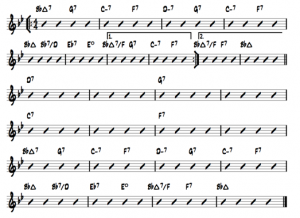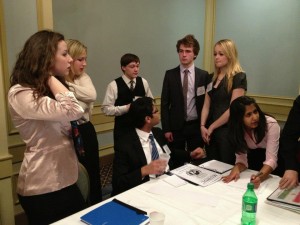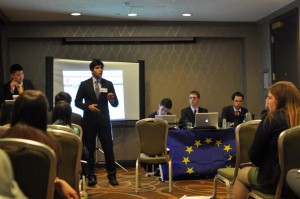
(An example of improv from Sonny Rollins, widely accepted as one of the greatest improvisers to ever live)
This screams MUN to me. The mixture of background knowledge, quick things, and skills at actually applying what’s in the brain in the two arts are exactly the same. Here are some lessons and ideas from the study of jazz improv that can dramatically improve your MUN skills and the way you think about MUN as a whole.
1. Past practice isn’t a guarantee of success: it’s a prerequisite to be able to do the real work
It’s easy to look at jazz improv like any other work you do in high school and college: the performance is a test, and you need to do x amount of work to succeed. Similarly, many delegates approach MUN this way: they think that there is a critical mass of research that, once done, guarantees success.
This isn’t the case. In jazz improv, practice is about giving yourself the vocabulary to be able to do the real work: to know the chords so well that they’re a second thought, and you can focus on the difficult work of constructing a melody. This can be applied to how we think about MUN: research is the establishment of a prerequisite foundation on which you can build your ideas and solutions on conference day.
2. What you’re making isn’t just for yourself: its music for other peoples ears
The music that a jazz improviser makes can’t only make sense within the improvisers head. The ideas that sound angelic in my head may sound like a dying animal to you, and vice versa. Improvised solos need to appeal to something common between you and your audience: a particular emotion, cultural standards for “good music”. Once you start connecting with your audience, you can truly begin to move them with your music.
The same goes for MUN: when crafting your ideas, you need to bear in mind the room you’re in. How will people perceive your ideas? What about your idea will appeal to other delegates? What currency does your idea hold with other delegates (Read: https://bestdelegate.com/three-currencies/ ). If you go beyond thinking about how the idea makes sense to you, and attempt to get in other peoples shoes and look at the idea, issues will immediately become apparent. Counterexamples will pop up in unexpected places. Accounting for these newfound holes will elevate the quality of your ideas.
3. You aren’t the only person making music: cooperation and communication with other thinkers is key
When soloing, you aren’t by yourself. You’re surrounded by what is called a rhythm section: that is, bass, piano and drums. It’s easy to go into a solo and play all of your own ideas while ignoring your surroundings. What’s difficult is to play with the people behind you, to trade ideas and establish a dialogue that makes the music more interesting.
In a MUN committee, everyone walks in with their ideas. When you write a resolution only to see it drilled and edited during the course of debate, its easy to take this personally: to assume that if any change is made to it, it’s a sign that your ideas are inadequate. This is like going into a solo and ignoring the musicians around you: you’re simply declaring your ideas, and writing off any interference from others as a personal attack on your music. Instead, the process of idea proposal, discussion, and editing in MUN should be viewed like a dialogue. Input from other delegates on your ideas or resolutions should be welcomed with open arms. This doesn’t only appease other delegates who may disagree with some of your points. It increases the richness of your own ideas, as other delegates ask questions you may not have thought of, and contribute their own two cents to the collective bank that is the worth of your idea.
4. The best ideas are the ones that are made in the moment
Take a quick listen to that Sonny Rollins video at the top of the article. Something that set Sonny aside from others was the fact that he was an absolute improviser: that is, he wasn’t playing memorized melodies and notes (called licks), but rather was creating music on the spot from his head. Many jazz musicians simply put together licks to form a solo. However, the most beautiful solos are the ones that come straight from the mind. These solos allow us to see the human mind at work, and be amazed at the capacity of the people who make them.
MUN is all about the ability to generate original, compelling ideas in the moment. Of course, oftentimes we use ideas made by other scholars and diplomats, or simply parrot the policy from the nation we are representing. However, the most compelling ideas are always the original ones, forged in the pressure chamber that is the committee room. For this reason, you shouldn’t be afraid to pose an idea that pops in your head, even if you have a completely different plan laid out. An idea during committee is like an epiphany on the bandstand: a moment of divine inspiration at just the right time. To waste that idea would be a crime, even if it is risky. Don’t underestimate the power of your own mind: when you’ve built a foundation of research, considered the people around you, and immersed yourself in a dialogue with other delegates, your mind is the perfect environment for an idea to form.




